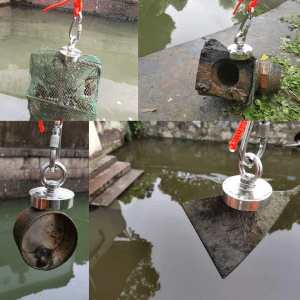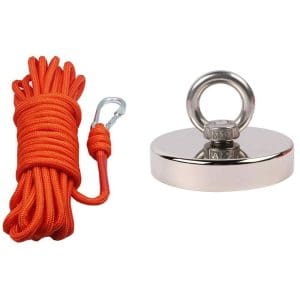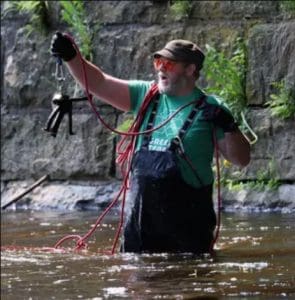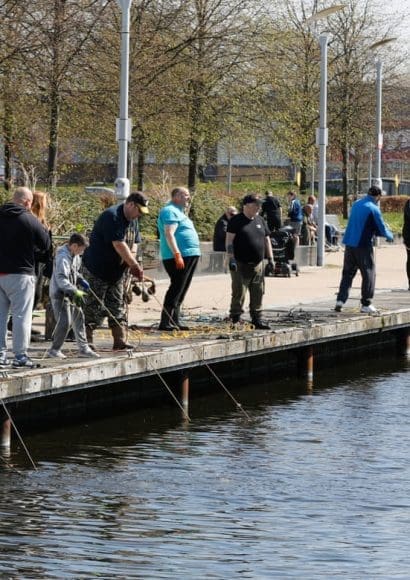
Magnet fishing has become increasingly popular among adventurers and treasure hunters. However, the legality of this practice has raised many questions. In this article, we will explore whether magnet fishing is illegal, the laws that regulate it, and the important considerations before you start.
Contents
What is Magnet Fishing?🐟
A Fascinating Activity
Magnet fishing involves using a strong magnet tied to a rope to retrieve metal objects submerged in bodies of water. It is an exciting activity for those who enjoy searching for hidden treasures, as the findings can range from common tools to historical artifacts. Participants often report the thrill of pulling up something unexpected from the depths, adding an element of surprise and adventure.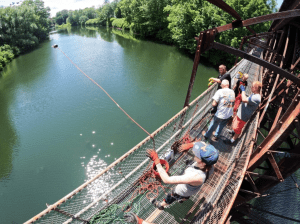
History and Origins
Although it seems like a recent trend, magnet fishing has historical roots. In the past, it was used to recover valuable objects or lost tools in ports and rivers. Today, it has become a popular recreational activity. Historically, magnets were employed by dock workers and sailors to retrieve metal objects that had fallen overboard. This practice ensured that valuable items were not permanently lost to the waters.
Legislation and Regulations🐟
Is Magnet Fishing Legal?
Generally speaking, magnet fishing is not illegal. However, its legality can vary depending on the location and circumstances. It is essential to research local laws before engaging in this activity. Understanding the legal landscape is crucial to avoid fines or legal issues that could arise from magnet fishing.
Laws by Country
-
- United States
- In most states, magnet fishing is legal, but there may be restrictions in national parks and private properties. Always check with local authorities. Some states have specific regulations regarding the recovery of historical artifacts or objects of significant value.
- United Kingdom
- Magnet fishing is legal, but in some places, it requires a permit. Additionally, recovering certain historical objects may be regulated by heritage laws. For example, the Treasure Act 1996 requires that any treasure found must be reported to the local coroner within 14 days.
- Germany
- In Germany, magnet fishing is legal, but it is prohibited in certain protected bodies of water. Additionally, any finds of historical significance must be reported to the authorities, as they are considered part of the national heritage.
- United States
Additional Legal Considerations
Recovery of Historical Artifacts
-
- If you find objects of historical value, you may need to turn them over to the authorities. Heritage laws protect these finds and can impose penalties on those who keep them. This is to ensure that items of cultural or historical significance are preserved for public benefit.

- If you find objects of historical value, you may need to turn them over to the authorities. Heritage laws protect these finds and can impose penalties on those who keep them. This is to ensure that items of cultural or historical significance are preserved for public benefit.
Private Property and Permits
-
- Practicing magnet fishing on private property without permission can be considered trespassing. Always seek permission before fishing in these areas. Landowners have the right to control activities on their property, and failing to obtain permission can lead to legal repercussions.
Environmental Considerations🐟
Impact on Nature
Magnet fishing can have both positive and negative effects on the environment. While it helps clean bodies of water of metal objects, it can also disrupt the aquatic ecosystem. Removing debris can improve water quality and prevent harm to wildlife, but care must be taken to avoid damaging natural habitats.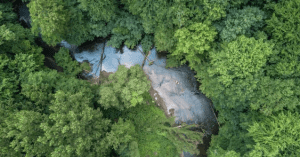
Best Practices
-
- Responsible Collection
- Remove the collected waste and dispose of it properly. Participating in local recycling programs can help ensure that metal waste is handled in an environmentally friendly manner.
- Habitat Care
- Avoid damaging aquatic plants and animal habitats while magnet fishing. Being mindful of where you cast your magnet and how you retrieve it can minimize the ecological impact.
- Responsible Collection
Necessary Equipment🐟
Magnet Selection
Types of Magnets
-
- Neodymium: These are the most commonly used due to their strong magnetic pull. They are highly effective for retrieving heavy and deeply buried objects.

- Ferrite: Less powerful but more affordable. These are suitable for beginners or for retrieving smaller items.
- Neodymium: These are the most commonly used due to their strong magnetic pull. They are highly effective for retrieving heavy and deeply buried objects.
Other Accessories
-
- Strong Rope
- Use a sturdy rope that can support the weight of the retrieved objects. Braided nylon ropes are often recommended for their durability and strength.
- Gloves and Protection
- Wear gloves to protect your hands and reduce the risk of injury. Additionally, using a bucket or container to collect your finds can help keep the area tidy.

- Wear gloves to protect your hands and reduce the risk of injury. Additionally, using a bucket or container to collect your finds can help keep the area tidy.
- Magnet Safety
- Magnets can be dangerous if not handled properly. Ensure that the magnet is kept away from electronic devices and medical implants, such as pacemakers, as the strong magnetic fields can cause damage or interference.
- Strong Rope
Stories and Anecdotes of Magnet Fishing🐟
Surprising Finds
Magnet fishing enthusiasts have found everything from bicycles and tools to valuable historical objects. Each find tells a story and adds excitement to this activity. For instance, some magnet fishers have reported uncovering antique weapons, safes, and even messages in bottles, each with its own unique history.
Communities and Events
There are online communities and events that bring together magnet fishing enthusiasts. Sharing experiences and knowledge in these spaces can be very enriching. Many enthusiasts join forums, social media groups, and local clubs to connect with others, share tips, and organize group outings. These gatherings can also be opportunities for learning and improving techniques.
Potential Risks and Safety Tips🐟
Physical Risks
Magnet fishing can pose certain physical risks, such as the danger of pulling up sharp objects or heavy items that can cause injury. Always wear protective gloves and consider using a grappling hook to secure larger finds before lifting them.
Legal Risks
As discussed, magnet fishing in prohibited areas or without proper permissions can lead to legal issues. It’s important to be aware of and comply with local laws and regulations to avoid fines or other legal consequences.
Environmental Risks
Removing objects from natural habitats can disturb wildlife and ecosystems. Always practice magnet fishing responsibly, ensuring minimal disruption to the environment.
Safety Tips
-
- Scout Locations Carefully
- Choose locations where magnet fishing is allowed and safe. Avoid areas with strong currents or known hazardous materials.
- Use Proper Gear
- Ensure you have the right equipment, including a strong magnet, durable rope, gloves, and a first aid kit.
- Be Aware of Your Surroundings
- Stay vigilant of your surroundings, especially when fishing near busy waterways or urban areas. Watch for boat traffic and other potential hazards.
- Go With a Partner
- Magnet fishing is safer and more enjoyable when done with a companion. They can help with heavy finds and provide assistance in case of an emergency.
- Scout Locations Carefully
Fishing with Lights Illegal.
Is fishing with lights illegal? Learn about the regulations surrounding the use of artificial lights in fishing, the environmental impact, and legal considerations you need to be aware of before you cast your line. Discover how local laws vary and what you can do to ensure your fishing practices are both legal and sustainable.
Conclusion🐟
Magnet fishing can be an exciting and rewarding activity, as long as it is practiced legally and responsibly. Research local laws, respect the environment, and enjoy the adventure of discovering hidden treasures underwater. The thrill of uncovering lost items and the potential historical significance of your finds add layers of excitement and fulfillment to this hobby.

